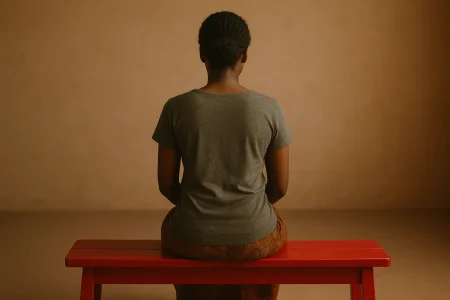
Beyond Normal: Understanding Your Body's Warning Signs
Every woman's menstrual cycle tells a story, but sometimes that story includes chapters we'd rather skip. Heavy periods disrupt plans, damage confidence, and leave us wondering what's normal. When bleeding overwhelms, the question isn't "why is this happening?" but "when should I be worried?" For Nigerian women, understanding the difference between heavy periods and fibroid-related symptoms could be the key to reclaiming their quality of life.
The Nigerian Reality: Why Fibroids Affect Us More
African women, particularly those of Nigerian descent, face a disproportionately high burden of uterine fibroids. Research from Nigerian teaching hospitals shows that over 80% of Black African women develop fibroids by age 50, with studies from tertiary hospitals in Nigeria reporting fibroid prevalence ranging from 30.7% of all gynaecological patients to as high as 67% in some populations.
Recent population-based research from the African Collaborative Centre for Microbiome and Genomics Research (ACCME) Study in central Nigeria confirms that Nigerian women experience unique patterns of fibroid development, with different risk factors compared to women in Western countries.
What Actually Counts as Heavy Bleeding?
"Heavy" feels subjective until you understand the medical definition. A systematic review of uterine fibroids in sub-Saharan Africa published in BMJ Open shows that in approximately 30% of cases, fibroids cause heavy menstrual bleeding, with menstrual disorders being the most common presentation in Nigerian hospitals at 64.3% of cases.
More practically, if you're changing a pad or tampon every hour, or passing blood clots the size of a quarter or larger, this warrants medical attention. When bleeding disrupts work, sleep, or daily activities, it's moved beyond "inconvenient" into "medical concern" territory.
Why Cost and Access Matter: The Nigerian Context
Recent analysis shows that fibroid treatment in Nigeria ranges from ₦700,000 to ₦3 million, depending on the procedure and location. In Lagos, traditional myomectomy costs between ₦700,000 and ₦1 million on the mainland, rising to ₦1-3 million on the island. Advanced treatments like High-Intensity Focused Ultrasound (HIFU) cost around ₦2 million.
These financial barriers mean many Nigerian women delay seeking treatment. Studies from Nigerian teaching hospitals show that most patients present with late-stage symptoms, including lower abdominal mass (67.7%) and severe anaemia, indicating delayed medical consultation.
Red Flag Symptoms: When to Act Immediately
Some symptoms demand urgent medical attention, and appointments are not scheduled. Based on Nigerian clinical experience, seek immediate care if you experience:
Emergency Warning Signs:
- Soaking through a pad or tampon every hour for several consecutive hours
- Sharp, sudden abdominal pain that doesn't respond to pain medication
- Signs of severe anaemia: dizziness, extreme fatigue, shortness of breath, or fainting
- Bleeding so heavily that it prevents normal daily activities
- Periods lasting longer than seven days
- Bleeding between periods
- Pelvic pressure or pain that interferes with sleep or work
- Frequent urination or difficulty emptying your bladder
- Noticeable abdominal swelling
The landscape of fibroid treatment in Nigeria has dramatically improved. Leading centres now offer minimally invasive procedures, including laparoscopic surgery, Uterine Fibroid Embolisation (UFE), and HIFU technology, which previously existed only abroad.
Specialist hospitals like Abiodun Falade Hospital, with branches in Lagos, Abuja, Port Harcourt, and Ibadan, report over 600 successful fibroid surgeries in the last two years, with pregnancies occurring as early as 8 weeks after myomectomy.
From Symptoms to Solutions: What to Expect
Treatment depends on symptom severity, fibroid size and location, age, and future pregnancy plans. Options now available in Nigeria include:
- Conservative management for small, asymptomatic fibroids
- Minimally invasive procedures, including laparoscopic and hysteroscopic surgery
- Non-invasive treatments like HIFU, available at centres like Nordica in Lagos
- Traditional surgery, when necessary, with improved techniques, reduces recovery time
Heavy periods and fibroids are common, treatable conditions, not life sentences. If bleeding disrupts your life, trust your instincts. With improving access to advanced treatments in major Nigerian cities and foundations offering subsidised care, options exist even within financial constraints.
The difference between heavy periods and fibroid symptoms often lies not in the bleeding itself but in getting the correct diagnosis and treatment. Don't wait for symptoms to become unbearable—your health and well-being are worth prioritising now, and quality care is increasingly available within Nigeria's borders.
Sources
- Frontiers in Pharmacology (2022): Uterine Fibroids - African Perspective - 80% prevalence in Black African women
- BMJ Open/PMC (2022): Epidemiology of Uterine Fibroids in Black African Women - Sub-Saharan Africa systematic review, 30.7% Nigerian hospital prevalence
- Scientific Reports/PMC (2023): Nigerian Population-Based Fibroid Study - ACCME cohort research in central Nigeria
- Nairametrics (2025): Fibroid Treatment Costs in Nigeria - Current pricing and access analysis
- PMC Clinical Study (2012): Nigerian Teaching Hospital 5-year Review - Clinical presentation patterns in Nnewi, Nigeria
- Abiodun Falade Hospital: Nigerian Fibroid Surgery Centre - Leading Nigerian treatment facility
- IRDOC Nigeria: Interventional Radiology in Nigeria - Minimally invasive treatments available locally




